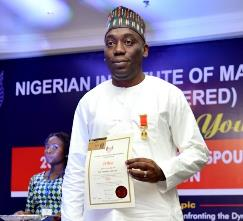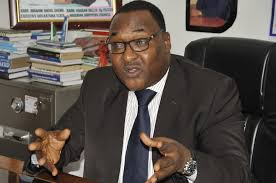*Elochukwu Flays FG Failure to Implement Solutions
The Nigerian Shippers Council (NSC) in conjunction with Nigeria Ports Authority (NPA) and other government agencies and stakeholders in the maritime industry have unveiled the Nigeria Port Process Manual (NPPM) in the Rivers State capital, Port Harcourt.
Described as a “critical document” in the cargo clearance chain, the NPPM was unveiled under the auspices of the Project Steering Committee (PSC) facilitated by the lead agency, NSC which has Mr. Hassan Bello as the Executive Secretary.
According to the participants at the one day sensitization event, the NPPM document key in addressing corruption and moderate maritime activities to meet global maritime standards.
Those who graced the occasion include concessionaires, shipping agents, clearing/forwarding practitioners as well as the Nigeria Customs Service (NCS), Nigerian Maritime Administration and Safety Agency (NIMASA), and the National Inland Waterways Authority (NIWA).
Describing the NPPM as “apt” in view of the challenges plaguing the nation’s seaports, Bello stated that it was the only way forward to close the huge gaps between what is happening in Nigeria and other developed maritime nations across the globe.
The NSC helmsman frowned at what he called ‘abysmal poor rating of transparency/corruption index indicators in Nigeria’ just as he pointed out that the launching of the NPPM would help to address the corruption in the maritime sector of the country.
His words: “NPPM is a key document to launch transparency and efficiency within the maritime corridors in Nigeria. It is unfortunate that Nigeria transparency index ranking in the world is 149th position out of 180 nations. For us, that is a near bottom position and we cannot continue in this way”.
Bello explained that the council as a leading Federal Government agency in the fight to ensure that the nation’s seaports and the maritime industry are corruption-free cannot do it alone.
While noting that it was a “collective responsibility”, he hailed NPA for reducing port charges even as he suggested that the only option that would encourage check-mating corruption and promote transparency was for practitioners to key into automation which would mean transacting businesses online.
He enjoined the management of Nigeria Immigration Service (NIS), NIWA, NRC, NIMASA, and others to work in the same direction of ensuring transparency.
According to Bello, the NSC is only leading the way, encouraging synergy with other agencies to make Nigerian shipping and maritime processes efficient. We are desirous to reduce vessel turnaround time through collaborative vessel boarding of all concerned agencies at anchorage.
He stated that training was critical and very important to reduce unnecessary delays of vessels on anchorage in the nation’s seaports.
He pointed out that NSC was not competing with other sister agencies, but requesting for co-operation and synergy, not only with other Federal Government agencies, but with concessioners, shipping and clearing agents.
His words: “The message is simple. There should be no delays, especially in the face of oil revenue dwindling prices. No competition, no rivalry. Nigerian ports must be efficient. We are determined to work with you. We must ensure that Nigerian ports are the hub in maritime actives in the West and Central African Sub regions”.
The Managing Director of NPA, Ms Hadiza Bala Usman had earlier in remarks applauded the PSC for job well done in the packaging and printing of NPPM.
Usman who was represented by the General Manager, Public Private Partnership (PPP), Mrs. Eniola Williams noted the Standard Operating Procedures (SOP) followed the same procedure just like NPPM.
She observed that NPA took the leading role in funding the steering committee which developed the NPPM document, stating that the manual contains detailed guidelines on port procedures.
“We believe that the manual will improve operations across the Nigerian ports and instill the culture of efficiency and transparency among maritime industry players”, she added.
The NPA Managing Director maintained that the authority would continue to be the gateway to economic activities in the country and was sure that the authority would no doubt achieve their set goals.
While giving an overview presentation of NPPM, NSC Deputy Director, Special Duties, Mr. Moses Fadipe said the process of producing an anti-system corruption manual as seen today was a 7 years journey, just as he pointed out that the manual would improve Nigerian image on corruption index.
He said the manual made proactive efforts to capture what ought to be operational processes from NCS, NIS and other government agencies.
According to Fadipe, the operating procedure defines what activities of all the agencies do and whom they are. It also has capacity for self-audit to ascertain whether positive progress is being made or if things are getting worst. This means is that there will be a guideline on Nigerian Custom Service, Nigerian Immigration and government agencies on their practice performance to ensure having a zero corruption practice.
His words: “A Port Standard Task Team will be on ground within the port corridors to ensure agency compliance with this document. In doing this, NSC is involved as a leading agency with other sister agencies like NPA, Customs and so on. The manual makes provision for step by step activities for arrival of vessels, including joint agency boarding and examination. After today, we will interface. We will request for feedback to know where there are possible infractions.’’
He enjoined all stakeholders, especially port users to try and comply with the provisions of the manual and to ensure co-operations.
Meanwhile, the former National President, Association of Nigeria Licensed Customs Agents (ANLCA), Chief Ernest Elochukwu has hailed NSC for its push to finding solution to the challenges facing shippers and other maritime group in course of their trade.
He however faulted the Federal Government for always playing to the gallery by its failure to strictly implement solutions that emerge from different workshops/seminars across the country in the past.
The former National President of ANLCA who spoke on the sideline of the sensitization awareness campaign queried the rational why more people want to be at the port, pointing out that this was this was not in line with global best practices.
Elochukwu who is also the Group Managing Director and Chief Executive Officer (CEO) Nestello Gateway Group observed that having more people and more agencies at the port only promotes corruption and mitigate efficiency and professionalism in the maritime industry.
He urged the Federal Government to take a second look at the way they prohibit items for importation, stating that prohibiting essential commodities without corresponding local manufacturing only promote corruption among officers and men of the NCS and called for a review.











